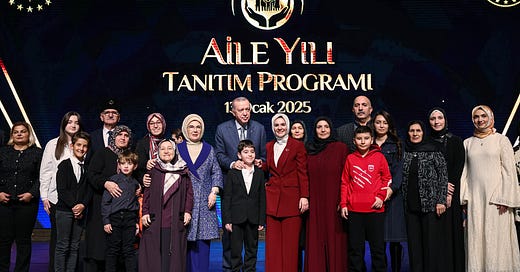ANKARA — Turkish Pres. Recep Tayyip Erdoğan has been talking about birth rates for a long time. In the late 2000s, he began calling on families to have “at least three children” and has since repeated the mantra:
“One [child] means loneliness, two means rivalry, three means balance and four means abundance.”
Over the same period, the Turkish leader has amplified anti-LGBTQ rhetoric, at times using the topic to mark ideological fault lines among voters, as he did during the 2023 elections.
In kicking off the new year, Erdoğan combined his long-held pro-family, anti-LGBTQ stances in declaring 2025 to be the “Year of the Family”.
The program, detailed in a ceremony Monday, offers increased financial incentives and state support to families in a government-led attempt to reverse the nation’s falling birth rate, which Erdoğan has defined as an “existential threat”.
“We will not only lose our population, but we will also lose our influence in the global arena,” Erdoğan said Monday.
Lawmakers and analysts told Turkey recap the new set of pro-family policies seek to address existing economic and demographic challenges in Turkey but are unlikely to impact national birth trends. Instead, they said the program may deepen polarization by promoting conservative narratives on the role of women and LGBTQ rights.
“Amid a deepening economic crisis and increasing difficulty in accessing basic needs, emphasizing [that families should have] three children through symbolic gestures like this disregards the struggles of the society,” said Aylin Nazlıaka, VP of the main opposition Republican People’s Party (CHP) overseeing Family and Social Services Ministry policies.
Incentives and disincentives
Keep reading with a 7-day free trial
Subscribe to Turkey recap to keep reading this post and get 7 days of free access to the full post archives.




